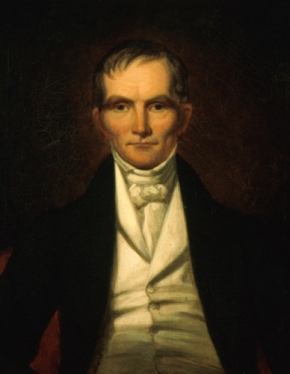You are here
Circuit Court Opinions:
Associate Justice Philip Pendleton Barbour, United States v. Myers (1836)

United States v. Myers, 27 F. Cas. 38 (C.C.E.D. Va. 1836) (No. 15,844) [Fifth Circuit]
Myers involved several legal issues, but perhaps the most significant was whether the federal court could exercise jurisdiction over cross-claims between two defendants. The case was properly filed in federal court because the United States was the plaintiff, having sued to recover a debt on duty bonds, also known as customs bonds. The defendants filed claims against each other, over which the federal court would not have had diversity jurisdiction, as both were citizens of Virginia. One of the defendants objected to the court’s jurisdiction over these claims, asserting that if the United States received satisfaction of its claim, the court would no longer have any basis for exercising jurisdiction over the remainder of the case.
The case was heard by Justice Barbour and Judge Peter Daniel, a future Supreme Court justice who had succeeded Barbour on the district court when Barbour was appointed to the Supreme Court. Both jurists agreed that if the court had jurisdiction over the case when it was filed, the resolution of part of the case could not subsequently deprive the court of jurisdiction. On this point, Barbour admitted, “I have felt a serious difficulty.” On one hand, he wrote, it seemed strange for the court to exercise jurisdiction indirectly over a claim when it could not have done so directly. On the other hand, Barbour acknowledged, “the inconveniences of a contrary course are so great.” The justice then gave two hypothetical examples of cases involving both citizens of Virginia and citizens of other states to illustrate the awkwardness that would ensue if the court could resolve the case as to some parties and not others.
With these practicalities in mind, Barbour concluded that the question of jurisdiction was a preliminary matter and that if the court determined that it had jurisdiction at the outset of a case, “it is then competent to make any decree which a state court might make.” Finding no case law to the contrary, Barbour and Daniel held that “a decree between co-defendants, though both citizens of Virginia, may be made in this court.” Beginning with Osborn v. Bank of the United States (1824), the Supreme Court developed a body of jurisprudence regarding federal courts’ exercise of jurisdiction over state-law claims that formed part of the same case or controversy as a federal claim. In 1990, Congress made courts’ authority to hear such claims, now known as supplemental jurisdiction, part of the U.S. Code.
